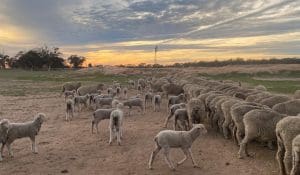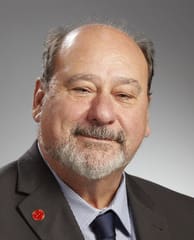
Mulesed Merino lambs with their mothers, Image – The Livestock Collective.
AUSTRALIA’S peak sheep and wool bodies have discounted the release of mulesing footage to United Kingdom parliamentarians as the UK-Australian Free Trade Agreement is considered by the UK Government.
Animal rights bodies in the UK are challenging the current free trade agreement that recognises the right of each country to regulate animal welfare protections.
Anti-wool body Collective Fashion Justice has also organised a petition aimed at phasing out mulesing and other sheep procedures in New South Wales and is working with another animal protection group FOUR PAWS to force Australia to regulate on the issue.
A CFJ release this week said FOUR PAWS UK has been invited to show the British parliament footage of lambs being mulesed while the Australian trade agreement was being discussed. The footage was provided by a whistleblower who filmed Merino lambs being mulesed on a New South Wales farm.
Click here to see the whistleblower footage and here to read the account of an elected UK official supporting FOUR PAWS.
The House of Commons Library website said the free trade agreement was formally laid before Parliament on 15 June 2022 under the Constitutional Reform and Governance (CRAG) Act 2010. This Act provides for a minimum of a further 21 sitting days before the UK can ratify the agreement. It is now being scrutinised by parliamentary committees. In the House of Commons, the International Trade Committee and the Environment, Food and Rural Affairs Committee are looking at the deal. The House of Lords International Agreements Committee is also scrutinising the agreement.
The HC Library said while there is no requirement for a vote or debate on the agreement, the Government has said it will seek to accommodate a request for a debate from the relevant select committees, subject to parliamentary time.
NSW MLC has lobbied UK parliamentarians

NSW MLC Mark Pearson
New South Wales MLC and Animal Justice Party member Mark Pearson spoke to UK parliamentarians via video recording at an event a few weeks ago.
He and Collective Fashion Justice have called for a ban on Australian wool imports into the UK until mulesing is completely phased out. The petition calls for a complete phase out of mulesing in New South Wales by 2030 and also calls for immediate mandatory uptake of pain relief during tail docking, castration and mulesing. Pain relief for mulesing is only mandatory in Victoria.
Mr Pearson aims to present the petition to the NSW Parliament in August this year if it gets a minimum of 500 signatures. It can only be signed by NSW residents. Click here to read the petition.
WoolProducers leader defends Australia’s animal welfare standards

WPA president Ed Storey
When asked if he is concerned that mulesing footage has been distributed to UK parliamentarians, WoolProducers Australia president Ed Storey said Australian sheep are raised consistent with national animal welfare standards and guidelines.
“There are two aspects to this issue, there is the regulatory aspect and there is the market.
“We produce animals here and raise them with long-term best welfare in mind and that’s done consistently with standards and guidelines across the country,” he said.
He said Australia had a robust regulatory regime to prosecute any breaches of animal cruelty laws.
Animals are raised under very different conditions in the UK, he said.
“They have enormous subsidies which we don’t have in Australia, but on the animal welfare side of it, they have their animals in barns for a number of months of the year and that’s quite appropriate given the climate they are in.
“Many Australian farmers would be horrified with that.”
On the issue of whether a phasing out of mulesing New South Wales by 2030 was feasible or appropriate, Mr Storey said WPA did not think a regulatory regime to ban a particular practice “necessarily leads to best practice welfare outcomes.”
But he recognised that the textile market was driving the trend against mulesing and the number of Australian flocks that had ceased mulesing was increasing.
“Australian wool growers and indeed NSW wool growers are very transparent.
“We know from the recent AWI/MLA survey around 45 percent of growers say they want to give up mulesing in the next five years,” he said.
“We know from the Wool 2030 work that the industry will all have the tools and be confident to use them by 2030, to manage breech flystrike in ways other than mulesing.
“A ban on particular process can often lead to perverse animal welfare outcomes and we are not in favour of it.”
When asked if WoolProducers would take any action as a result of the new petition or the release of the mulesing foot in the UK, Mr Storey said WPA is a strong advocate for the UK-Australia Free Trade Agreement.
“UK consumers can have confidence in the products we produce here, just as our consumers should have confidence in any products that come from the UK under the trade arrangement.”
Referring to Collective Fashion Justice linking a call for funding to the mulesing petition, Mr Storey said individual groups will try to use the issue to “feather their own nests and gain more financial support for their own organisations.”
“A lot of these organisations are competing very hard to sometimes unaware consumers to give them money.
“That is what this is about, quite often.”
SPA encourages mulesing phase-out when ‘practical’
When asked if Sheep Producers Australia is concerned about the UK developments, SPA chief executive officer Bonnie Skinner said sheep producers and wool growers are the biggest advocates of animal welfare, and they are the ones who invest in the wellbeing of their animals daily, not animal rights groups.
On the feasibility and appropriateness of a mulesing phase-out in New South Wales by 2030, Ms Skinner said Sheep Producers Australia encourages sheep producers to phase out mulesing as soon as practical; however, it recognises that until this can occur best practice must be followed and pain relief must be used.
“SPA is committed to advocating that a range of suitable pain relief options must be available to enable producers to follow best practice pain management.”
Ms Skinner said SPA and WPA initiated the development of the Sheep Sustainability Framework (SSF) to demonstrate Australia’s sustainable practices, identify areas for improvement, more effective ways to communicate with our customers and consumers.
“Initiatives such as the SSF place mulesing in context amongst the other animal husbandry procedures that Australian wool growers undertake to provide holistic animal welfare outcomes.”
The UK/Australia FTA remains on track for final signing this year, according to Meat & Livestock Australia.



This free trade agreement was always going to be in trouble with mulesing and now it appears it’s going to bite us on the backside. It isn’t an even playing field and you can not use their subsidies as a counter argument, as the livestock farmers that I have visited in Europe have so much control over their practices that they need to be subsidised. A dairy farmer we went to over there said that any animal practices that required the skin to be broken/cut had to be done by a vet.
If I was an English sheep farmer, I would be cranky if I knew my government was going to let meat into my country that was not raised under the same standards or similar to the one that we had to work under.
I find the answer to all of this pretty simple.
Why would I breed Merino sheep that need mulesing when they can be bred to produce a productive and highly efficient sheep that does not need to be mulesed?
When we breed sheep that don`t need to be mulesed many other benefits are seen.
This can and is being achieved by using the genetic solution.
The sheep meat industry has done a very good job to stay out of the mulesing debate and let the poor old wool industry take all the flak. It may well be time to consider changing Responsible Wool Standard groups to Responsible Sheep Standard groups and have the sheep meat supply chain involved. We are going to cop heat from the Poms, as we should, so why not be on the front foot for a change rather than set ourselves up for yet another public flogging?
Excellent point, Dirk. Last month, I went on four-week tour of Queensland, Tasmania, Victoria and New South Wales, and stayed with several amazing producers, most of which are Responsible Wool Standard or SustainaWOOL accredited. These farmers would have classed themselves as ‘wool producers’ – fine Merino – yet I asked the silly question: “What percentage of your income comes from sheep meat vs wool?” They both said 60-70pc from lamb (at current prices). So they are very much in the protein business.
All these sheep producers were using pain relief for tail docking and castration. They are making that investment and are part of a small, but growing group leading the industry. RWS and other wool accreditation schemes have driven forward welfare and environmental standards immensely over the last decade. My feeling is that lamb producers – most of which grow wool also – that meet RWS, Global Animal Partnership or equivalent standards, should be able to sell lamb to the United Kingdom.
I am bemused that there does not appear to be any RWS-type equivalent for the leading Aussie prime lamb producers. Why can’t those who invest in the highest welfare standards – above the mandatory requirements – also see premiums as accredited wool producers do?
A ‘Responsible Sheep Standard’ is an excellent idea. We have RSPCA-approved chicken, egg and pork – why no lamb? I can’t understand why Meat & Livestock Australia isn’t getting on the front foot on this issue, thus clearing the welfare agenda pathway for exporting lamb to the UK and other premium markets?
“There is a recognised and accepted alternative to mulesing and that is freeze branding – the application of liquid nitrogen to the breech” is like suggesting that the future of our great industry is show judging and the associated quilt making ribbons.
Sorry Andrew Farran, but that ol’ chestnut, the ever hopeful silver bullet, freeze branding, is not recognised and most definitely not accepted unless it’s new news that occurred overnight.
Sounds like there’s a vested interest here somewhere and reeks of an ignorance/arrogance of the subject at hand, or maybe the realisation that a full blown change of genetics is the only (well-rehearsed) answer to this discussion.
If you are an actual grower, spare a paddock and a few bucks to trial new era genetics to guide you toward a far less invasive Merino future.
More so I’ll pay your one way airfare to Classings Classic’22 Poll Merino Ram Sale at the Murray Bridge Racing Club S.A. on Monday September 5th so that you can see first hand at what new era genetics can create. (providing you don’t upgrade to Executive or live in Venezuela.)
It’s an easier solution – don’t breed from any genetic that breeds a breech wrinkle that requires ‘freezing-off’ in the first place!
I’m afraid Mr Storey’s comments about UK subsidies and housing sheep in barns for months is completely incorrect. We certainly do not have enormous government support and have not received any type of headage payment for 20-plus years, unlike some in the EU. Standards here in the UK are very different and that is most definitely recognised by the British consumer.
There is a recognised and accepted alternative to mulesing and that is freeze branding — the application of liquid nitrogen to the breech. By any definition, freeze branding is not mulesing — no cutting and no shedding of blood.
Some so-called representative industry groups wear blinkers on the issue, which clearly hides an ulterior motive. Mulesing as well as being painful is relatively cheap, but how can that be squared with their assertions on animal welfare? Enough said.